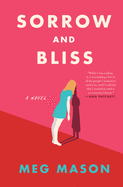
Martha would be the first to admit that she's a handful. She throws things at her husband, Patrick, and makes literal messes for him to clean up. That readers of Sorrow and Bliss will, like Patrick, put up with Martha is a testament to Meg Mason's comedic chops, which find improbably agreeable accommodation in a novel about dealing with mental illness.
Martha narrates Sorrow and Bliss, which begins during a crisis in her marriage. From there the narrative rewinds to her London childhood and proceeds through years marked by her episodic despair. As she makes her way to the present, Martha considers her checkered employment history (she's briefly what she calls a "chair describer" for World of Interiors magazine), her disastrous 43-day marriage to an art broker "with a focus on pastoral art and sourcing it for oligarchs," and her relationships with family members, including her aggressively reproductive sister. Waiting in the wings for much of Martha's life is Patrick, her cousin's childhood schoolmate. By the time Martha and Patrick finally get together, he's willing to tolerate her cruelty. Until the day he isn't.
Running alongside Sorrow and Bliss's dry comedy is a sobering inquiry: How accountable for her actions is someone suffering from mental illness? While the novel is awash in compassion for those who, as Martha puts it, "find it more difficult to be alive than other people," Mason (You Be Mother) doesn't give her harum-scarum protagonist a pass. As for Patrick, he's not off the hook either. --Nell Beram, author and freelance writer

